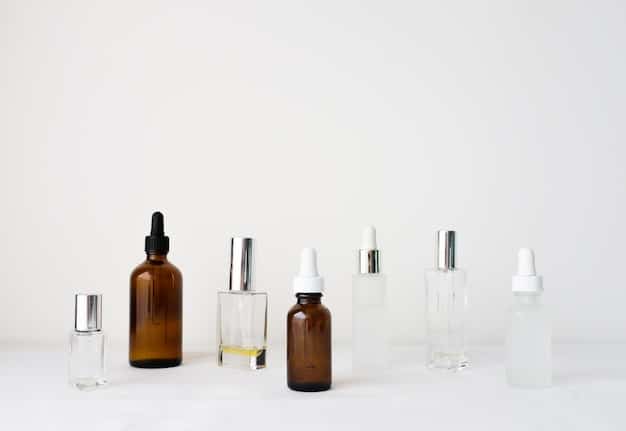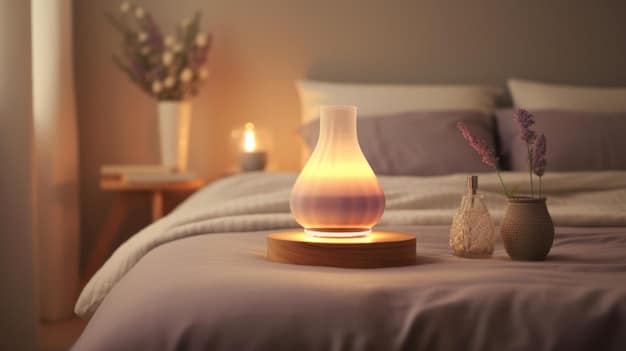Nighttime Skincare Rituals: Maximize Skin Repair While You Sleep

A meticulously crafted nighttime skincare ritual is essential for optimizing the skin’s natural repair cycle, leveraging the sleep period to address various concerns and ensure a healthier, more resilient complexion. This strategic approach maximizes product efficacy, allowing active ingredients to deeply penetrate and rejuvenate the skin without environmental interferences.
As the day winds down, your body, including your skin, transitions into a crucial repair mode. Understanding and leveraging this natural process through effective Nighttime Skincare Rituals: Maximize Your Skin’s Repair Process While You Sleep is not just a luxury but a fundamental component of maintaining skin health and vitality. This dedicated time allows your skin to recover from daily aggressors and absorb nutrient-rich treatments without interruption.
The Science Behind Nighttime Skin Repair
Our skin is an incredible organ, constantly working to protect us from the outside world. Throughout the day, it battles environmental aggressors like UV radiation, pollution, and free radicals, all of which contribute to cellular damage and premature aging. However, when we sleep, a remarkable shift occurs: the skin ramps up its natural repair and regeneration processes, becoming more receptive to active ingredients and initiating crucial restorative functions.
During the night, blood flow to the skin increases, supplying essential nutrients and oxygen for cell renewal. Melatonin, the sleep hormone, also acts as a potent antioxidant, helping to neutralize free radicals accumulated during the day. This period is when the skin’s barrier function is slightly more permeable, meaning products applied before bed can penetrate more deeply and work more effectively. Essentially, your skin transitions from a protective mode to a restorative one, making nighttime the prime opportunity for targeted treatment.
Understanding Circadian Rhythms and Skin Health
The skin’s activity is largely governed by circadian rhythms, our internal 24-hour clock. These rhythms dictate when certain biological processes peak and trough. For instance, cellular mitosis (cell division), which is vital for skin renewal, significantly increases at night, typically between 11 PM and 4 AM. Conversely, the skin’s protective functions, like sebum production and barrier protection, are more active during the day. By aligning your skincare routine with these natural cycles, you enhance your skin’s innate ability to heal and rejuvenate.
- Increased cellular regeneration: Skin cells divide and repair at a faster rate during sleep.
- Enhanced barrier permeability: Allows for deeper penetration of active ingredients.
- Reduced external stressors: No exposure to UV, pollution, or makeup, enabling uninterrupted repair.
Ignoring this nocturnal repair window is a missed opportunity. Without a dedicated nighttime routine, your skin might struggle to recover fully, leading to a duller complexion, increased sensitivity, and potentially accelerated signs of aging. It’s about working with your body’s natural clock, not against it.
The meticulous application of specific products during this time supports these biological processes, ensuring that your skin receives the optimal care it needs to bounce back stronger and healthier each morning. This strategic approach transforms your sleep into a beauty treatment.
Building Your Essential Nighttime Skincare Routine
Crafting an effective nighttime skincare routine doesn’t have to be complicated, but it does require strategic product selection and consistent application. The goal is to cleanse, treat, and protect, enabling your skin to perform its restorative functions unimpeded. Begin by removing all makeup and impurities, setting a clean and receptive canvas for subsequent treatments.
A well-structured routine is not just about the products themselves, but also the order in which they are applied. Each step builds upon the last, maximizing absorption and efficacy. Think of it as preparing your skin for its nightly reset button, allowing it to fully utilize the potent ingredients you apply.
Step-by-Step Guide to a Powerful Routine
Starting with a clean slate is non-negotiable. Double cleansing, especially if you wear makeup or live in a polluted environment, ensures all traces of dirt and impurities are removed without stripping the skin of its natural oils. This prepares your skin to fully absorb the benefits of the products that follow.
- Cleansing: Use an oil-based cleanser first to break down makeup and SPF, followed by a gentle, water-based cleanser to remove any remaining residue and cleanse the skin thoroughly.
- Toning: A hydrating or pH-balancing toner can help restore the skin’s natural balance and prepare it for better absorption of active ingredients.
- Targeted Treatments (Serums): This is where you address specific concerns. Serums with ingredients like retinol, hyaluronic acid, vitamin C (though often preferred in the morning, some formulations are stable for night), or peptides can target aging, hydration, hyperpigmentation, or acne.
- Eye Cream: The delicate skin around the eyes requires a specialized product designed to hydrate and treat fine lines, dark circles, or puffiness without causing irritation.
- Moisturizer: A nourishing night cream helps to seal in all the previous layers of product and provides a protective barrier against moisture loss throughout the night.
Each step is crucial, and rushing through them can diminish the overall effectiveness. Consistency is key; a routine performed regularly yields significantly better results than sporadic, intense treatments.
Remember that listening to your skin is paramount. Adjust your routine based on your skin’s needs, seasonal changes, and how it responds to different products. A personalized approach ensures optimal results and a healthy, glowing complexion.
The Power of Active Ingredients for Overnight Repair
Selecting the right active ingredients is perhaps the most impactful aspect of your nighttime skincare ritual. These powerful compounds are formulated to penetrate deeply and work synergistically with your skin’s natural regenerative processes to address specific concerns, from aging and fine lines to hyperpigmentation and dryness. Understanding their benefits helps you make informed choices for your particular skin type and needs.
The hours you spend sleeping are a prime opportunity for these ingredients to work their magic. Without the constant exposure to environmental aggressors or the need for makeup, these potent formulations can dedicate their full power to repair and rejuvenation, leaving your skin noticeably improved by morning.
Key Ingredients to Look For
When curating your nighttime treatments, focus on ingredients known for their reparative and regenerative properties. Integrating these into your routine can lead to significant improvements in skin texture, tone, and overall health. Always introduce new actives slowly to allow your skin to adjust.
- Retinoids (Retinol, Tretinoin): Widely recognized as gold-standard anti-aging ingredients, retinoids accelerate cell turnover, stimulate collagen production, and reduce the appearance of fine lines, wrinkles, and hyperpigmentation. They are best used at night due to their photosensitivity.
- Hyaluronic Acid: While beneficial day or night, a hyaluronic acid serum before bed can significantly boost hydration, plumping the skin and improving its elasticity as you sleep.
- Peptides: These short chains of amino acids signal the skin to produce more collagen and elastin, aiding in firming and reducing wrinkles. They are excellent for repair and anti-aging.
- Alpha Hydroxy Acids (AHAs) & Beta Hydroxy Acids (BHAs): Exfoliating acids like glycolic, lactic, or salicylic acid can be used at night to gently shed dead skin cells, revealing a brighter, smoother complexion. AHAs improve texture and tone, while BHAs are ideal for oily and acne-prone skin.
- Antioxidants (Vitamin C, E, Resveratrol): While vitamin C is often used in the morning for protection, stable forms can be included at night to repair damage and promote collagen synthesis. Vitamin E and resveratrol also combat free radical damage accumulated during the day.
The combination of these ingredients, tailored to your skin’s specific concerns, creates a powerful regimen. For example, a retinoid for cell renewal, paired with hyaluronic acid for hydration, provides a comprehensive approach to nocturnal skin repair.

However, it’s crucial to avoid over-exfoliating or combining too many potent actives without proper guidance, as this can lead to irritation. Start with one new active at a time and observe your skin’s response, gradually building up frequency as tolerated.
Addressing Specific Skin Concerns Overnight
The nighttime hours offer an unparalleled opportunity to target specific skin concerns with precision and efficacy. While we sleep, our skin is less exposed to environmental stressors and more receptive to treatment, making it the ideal time for concentrated product application. Whether you’re battling acne, seeking to diminish fine lines, or struggling with chronic dryness, tailoring your evening routine can yield significant improvements.
Personalizing your ritual goes beyond simply applying products; it involves understanding what your skin truly needs and providing it with the most potent and effective solutions during its peak repair phase. This targeted approach ensures that your efforts translate into visible, lasting results.
Targeted Solutions for Common Skin Issues
Each skin concern has specific ingredients and approaches that work best during the night. By focusing on these, you can optimize your routine for maximum benefit. Consistency in application is key to seeing a transformation.
- Aging/Fine Lines: Retinoids are paramount. They accelerate cell turnover and boost collagen production. Pair them with peptide-rich serums to strengthen the skin’s structure and reduce wrinkle depth. Antioxidants like resveratrol also help combat age-related damage.
- Acne/Breakouts: Salicylic acid (BHA) can deeply penetrate pores to dissolve oil and dead skin cells, preventing breakouts. Benzoyl peroxide can also be used as a spot treatment. Niacinamide helps reduce inflammation and regulate oil production, making it an excellent all-rounder.
- Hyperpigmentation/Dark Spots: Ingredients like alpha arbutin, kojic acid, azelaic acid, and certain forms of vitamin C (stable derivatives) can inhibit melanin production and fade existing dark spots. Retinoids also contribute by speeding up skin cell renewal.
- Dryness/Dehydration: Rich, occlusive moisturizers containing ceramides, cholesterol, and fatty acids are essential to replenish the skin barrier. Layering with hyaluronic acid serums and sleeping masks can provide an intense hydration boost, locking in moisture throughout the night.
- Sensitivity/Redness: Focus on soothing ingredients such as centella asiatica (cica), aloe vera, colloidal oatmeal, and chamomile. Avoid harsh exfoliants or highly active ingredients. A simple, nourishing routine helps strengthen the barrier and reduce inflammation.
Remember that patience is crucial. Significant skin improvements rarely happen overnight. Consistent application, typically over several weeks to months, is necessary to see the full potential of these targeted treatments.
Integrating one or two targeted treatments into your nightly ritual ensures that you’re directly addressing your most pressing skin concerns, allowing your skin to regenerate and heal more effectively while you rest. This deliberate strategy empowers your skin to achieve its best possible state.
The Role of Environment and Lifestyle in Nighttime Skincare
While the products we apply are crucial, the efficacy of nighttime skincare rituals is significantly influenced by our broader environment and lifestyle choices. Factors like sleep quality, indoor air quality, and evening habits can either support or undermine the skin’s nocturnal repair processes. Creating an optimal overnight environment is just as important as selecting the right serums and creams.
Your surroundings and daily routines contribute immensely to your skin’s overall health and ability to repair itself. Addressing these external and internal elements ensures that your skin is in the best possible condition to absorb and utilize the benefits of your carefully chosen products. It’s a holistic approach to skin wellness.
Optimizing Your Sleep Environment and Habits
A truly effective nighttime ritual extends beyond the bathroom counter. It encompasses the entirety of your evening and sleep experience. Small adjustments can amplify the results of your skincare efforts, leading to a more refreshed and revitalized complexion.
- Quality Sleep: Aim for 7-9 hours of uninterrupted sleep. During deep sleep cycles, cell regeneration significantly increases. Poor sleep quality leads to increased cortisol levels, which can break down collagen and exacerbate skin issues like acne and inflammation.
- Pillowcases: Switch to silk or satin pillowcases. Unlike cotton, these materials cause less friction on the skin, reducing the chances of sleep lines and irritation. They also absorb less moisture, keeping your skincare products on your face, not your pillow.
- Humidity Levels: Use a humidifier, especially in dry climates or during winter. Optimal humidity prevents transepidermal water loss (TEWL) during the night, keeping your skin hydrated and allowing your barrier to function optimally.
- Temperature Control: Keep your bedroom cool. A cooler environment promotes better sleep and can help reduce inflammation and redness in the skin.
- Evening Meal and Hydration: Avoid heavy, sugary, or salty meals close to bedtime, as they can lead to puffiness and inflammation. Ensure adequate water intake throughout the day, but avoid excessive drinking right before bed to prevent frequent bathroom trips that disrupt sleep.
- Screen Time: Minimize exposure to blue light from screens (phones, tablets, laptops) at least an hour before bed. Blue light can disrupt melatonin production, affecting sleep quality and, consequently, skin repair.

These lifestyle adjustments, when combined with a consistent and targeted skincare routine, create a powerful synergy that promotes deep skin regeneration. It’s about nurturing your skin from the inside out, ensuring every aspect of your bedtime ritual supports its natural healing capabilities.
Neglecting these elements can diminish the effects of even the most expensive skincare products. A holistic approach that respects the skin’s biological needs is the cornerstone of truly maximizing your skin’s repair process while you sleep.
Common Nighttime Skincare Mistakes to Avoid
While the intention behind a nighttime skincare ritual is to maximize repair, certain common mistakes can inadvertently sabotage your efforts. Even with the best products, incorrect application or overlooked steps can hinder absorption, cause irritation, or simply negate the benefits you’re striving for. Being aware of these pitfalls is the first step towards rectifying them and ensuring your routine is as effective as possible.
Many individuals believe they are doing everything right, when in fact, subtle errors can make a significant difference. It’s not just about what you apply, but also how and when. By avoiding these common missteps, you can truly unlock the full potential of your evening skincare regimen and realize consistently healthy, radiant skin.
Pitfalls That Undermine Your Evening Routine
Attention to detail and a scientific approach to product usage are essential. Correcting these common mistakes can elevate your nighttime skincare from merely good to truly transformative, ensuring every minute of your sleep contributes positively to your skin’s health.
- Going to Bed Without Cleansing: This is arguably the biggest mistake. Sleeping with makeup, dirt, and pollution on your face clogs pores, promotes bacterial growth, and prevents your skin from performing its vital overnight repair functions. Always double cleanse.
- Applying Products in the Wrong Order: The general rule is to apply products from thinnest consistency to thickest. Applying a heavy cream before a light serum can create a barrier, preventing the serum’s active ingredients from penetrating effectively.
- Using Too Many Actives at Once: While individual active ingredients are powerful, combining too many potent serums (e.g., strong retinoids, AHAs, and vitamin C) in one night can lead to irritation, redness, and compromise the skin barrier. Introduce new actives one at a time and alternate their use.
- Not Giving Products Enough Time to Absorb: Rushing through your routine by layering products too quickly means they might not fully absorb. Give each product a minute or two to sink in before moving to the next step.
- Neglecting Neck and Décolletage: These areas often show signs of aging just as much as the face but are frequently ignored. Extend your facial skincare ritual down to your neck and upper chest.
- Inconsistent Routine: Skipping nights or being inconsistent dilutes the long-term benefits. Regularity is key for sustained skin improvement and allows your skin to adapt and respond effectively to treatments.
- Lack of Hydration: Even oily skin types need hydration at night. A good moisturizer helps replenish the skin’s barrier and prevents moisture loss, regardless of skin type.
Rectifying these common errors can significantly enhance the efficacy of your nighttime skincare ritual. It’s about being mindful and deliberate with each step, understanding how each product interacts with your skin and with each other. A strategic and consistent approach is what truly makes a difference in achieving optimal skin health.
By avoiding these missteps, you ensure that your precious hours of sleep are maximized for skin repair, waking up to a visibly healthier and more radiant complexion every morning.
The Evolution of Nighttime Skincare: Trends & Innovations
The landscape of skincare is constantly evolving, and nighttime rituals are no exception. Driven by scientific advancements, a deeper understanding of skin biology, and consumer demand for more effective and personalized solutions, innovations in products and technologies are continuously emerging. Staying abreast of these trends can help refine your routine and ensure you’re utilizing the most effective tools for nocturnal skin repair.
The future of nighttime skincare isn’t just about new ingredients; it’s about smarter delivery systems, sustainable practices, and a more holistic approach that integrates technology and personalized data. These advancements promise even more targeted and efficient ways to care for your skin while you sleep, making your nightly ritual more powerful than ever before.
Emerging Trends and What to Expect
From biotech-powered ingredients to AI-driven personalization, the innovations in nighttime skincare are designed to make your routine more effective, efficient, and tailored to your unique needs. Embracing these advancements can significantly enhance your skin’s repair process.
- Biomimetic Ingredients: These are ingredients designed to mimic the skin’s natural compounds (like ceramides or squalane), allowing for more seamless integration and enhanced barrier repair. Expect more sophisticated formulations that work in harmony with your skin’s own biology.
- Wearable Tech for Skin Analysis: Devices that monitor skin hydration, temperature, and environmental exposure throughout the day could soon recommend personalized nighttime treatments based on real-time data, optimizing product choices dynamically.
- Microbiome-Friendly Formulations: A growing focus on the skin’s microbiome means more nighttime products will be formulated to support a healthy balance of bacteria on the skin, crucial for barrier function and overall skin health. Probiotics and prebiotics will become more common.
- Sustainable and Clean Beauty: Consumers continue to demand ethically sourced, environmentally friendly, and “clean” formulations. Nighttime skincare will see more refillable packaging, waterless formulations, and plant-derived alternatives to traditional actives.
- Exosomes and Growth Factors: Advanced biotech ingredients like exosomes and human growth factors are gaining traction for their potent regenerative and repair capabilities, offering new avenues for anti-aging and wound healing during sleep.
- Personalized Skincare Systems: AI and DNA analysis could lead to even more highly customized nighttime routines, with products formulated specifically for an individual’s genetic predispositions and skin concerns, delivered through subscription models.
These trends highlight a move towards smarter, more sustainable, and increasingly individualized approaches to skincare. As we look ahead, the nighttime ritual will become even more sophisticated, leveraging cutting-edge science to deliver unparalleled results.
Keeping an eye on these developments ensures that your nighttime skincare ritual remains at the forefront of innovation, continually evolving to meet your skin’s needs and maximize its repair potential. The future promises a truly personalized and highly effective path to radiant, healthy skin.
| Key Aspect | Brief Description |
|---|---|
| 🌙 Optimized Repair | Skin’s natural repair cycle peaks at night, making it crucial for effective treatment. |
| 🧪 Active Ingredients | Retinoids, Hyaluronic Acid, Peptides best used at night for deep penetration. |
| 🚫 Avoid Mistakes | Always cleanse, apply products in order, and avoid over-exfoliating. |
| ✨ Holistic Approach | Quality sleep, silk pillowcases, and home humidity boost product efficacy. |
Frequently Asked Questions About Nighttime Skincare
Nighttime skincare is crucial because your skin enters a repair and regeneration mode while you sleep. Blood flow increases, cellular turnover accelerates, and the skin barrier becomes more permeable, allowing active ingredients to penetrate deeper and work more effectively without environmental interferences like UV rays or pollution. It’s the prime time for active ingredients to truly make a difference.
After thorough cleansing (often double cleansing), apply products from thinnest to thickest consistency. The typical order is: toner, thin serums (e.g., hyaluronic acid), targeted treatments (e.g., retinol, peptides), eye cream, and finally, a richer moisturizer or night cream. This layering ensures optimal absorption and efficacy of each product, sealing in moisture.
While you can use the same daily moisturizer at night, it’s often beneficial to have a dedicated night cream. Night creams are typically richer, more nourishing, and may contain higher concentrations of reparative ingredients without SPF. They are designed to support the skin’s regeneration process and prevent moisture loss during a longer period of rest.
Sleep quality significantly impacts skincare results. During deep sleep cycles, the body produces human growth hormone, essential for cellular regeneration and collagen production. Poor sleep can lead to increased cortisol (stress hormone), which breaks down collagen and can worsen issues like inflammation, acne, or premature aging. Adequate sleep enhances every product’s effectiveness.
Yes, retinoids (like retinol and tretinoin) are best reserved for nighttime use because they can increase sun sensitivity and degrade in UV light. Similarly, strong exfoliating acids (AHAs/BHAs) are often recommended for evening application to prevent photosensitivity and allow the skin to rejuvenate overnight, minimizing morning sun exposure to freshly exfoliated skin.
Final Thoughts: Embracing the Night for Radiant Skin
The journey to healthier, more radiant skin doesn’t end when the sun sets; it truly begins. Embracing a rigorous and thoughtful nighttime skincare ritual is perhaps the most impactful step you can take to harness your skin’s natural repair mechanisms. By understanding the science behind nocturnal regeneration, diligently selecting powerful active ingredients, and fostering an optimal sleep environment, you transform your sleep into a powerful beauty treatment.
This isn’t merely about vanity; it’s about supporting your skin’s fundamental health, building resilience against daily stressors, and ensuring its longevity. Consistency, intentionality, and a willingness to adapt your routine to your skin’s changing needs are the cornerstones of success. As you drift off to sleep, rest assured that your skin is diligently working, repairing, and renewing itself, all thanks to the dedicated care you provide. Wake up not just refreshed, but visibly rejuvenated, ready to face the new day with a glowing, healthy complexion.





